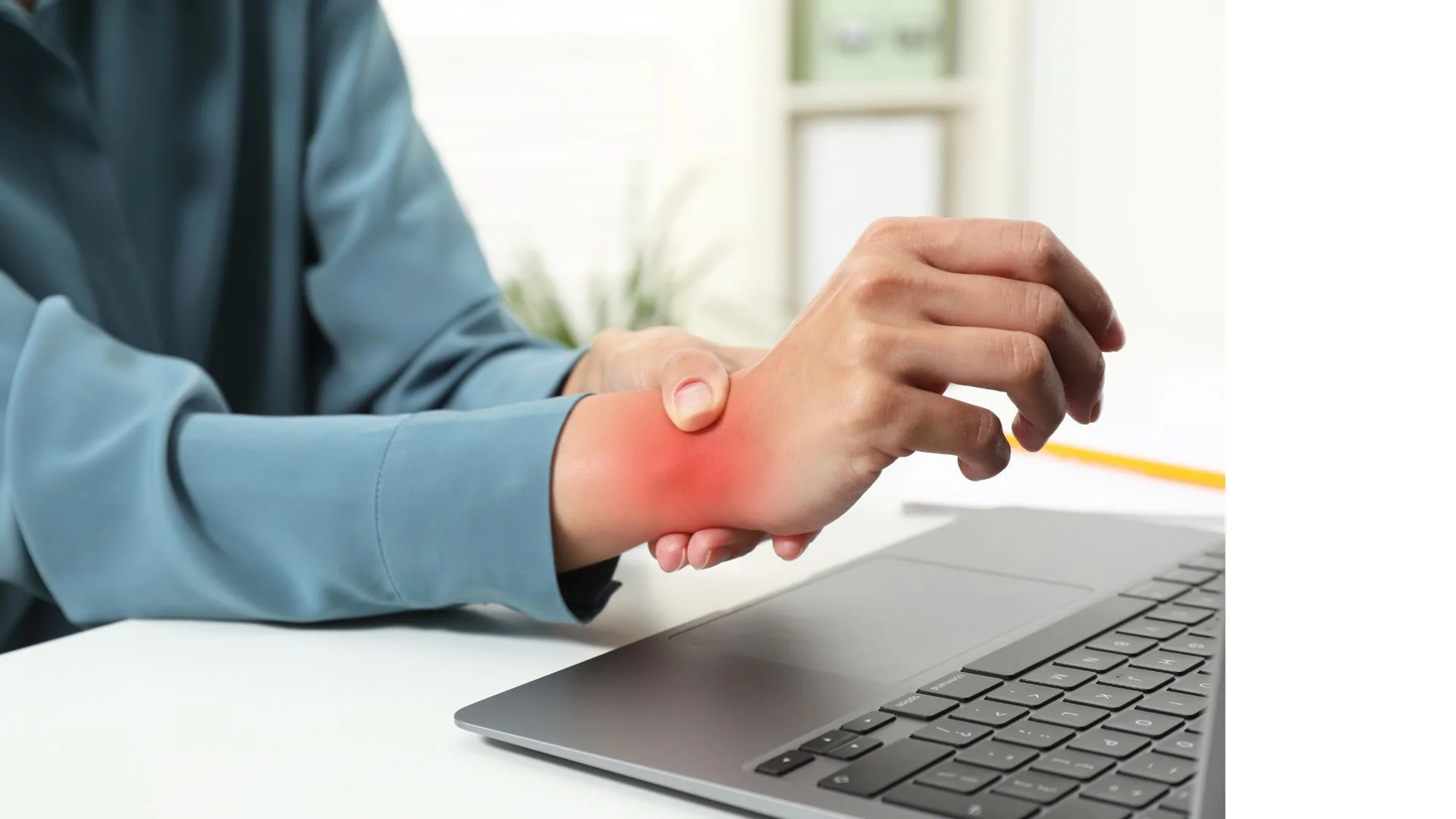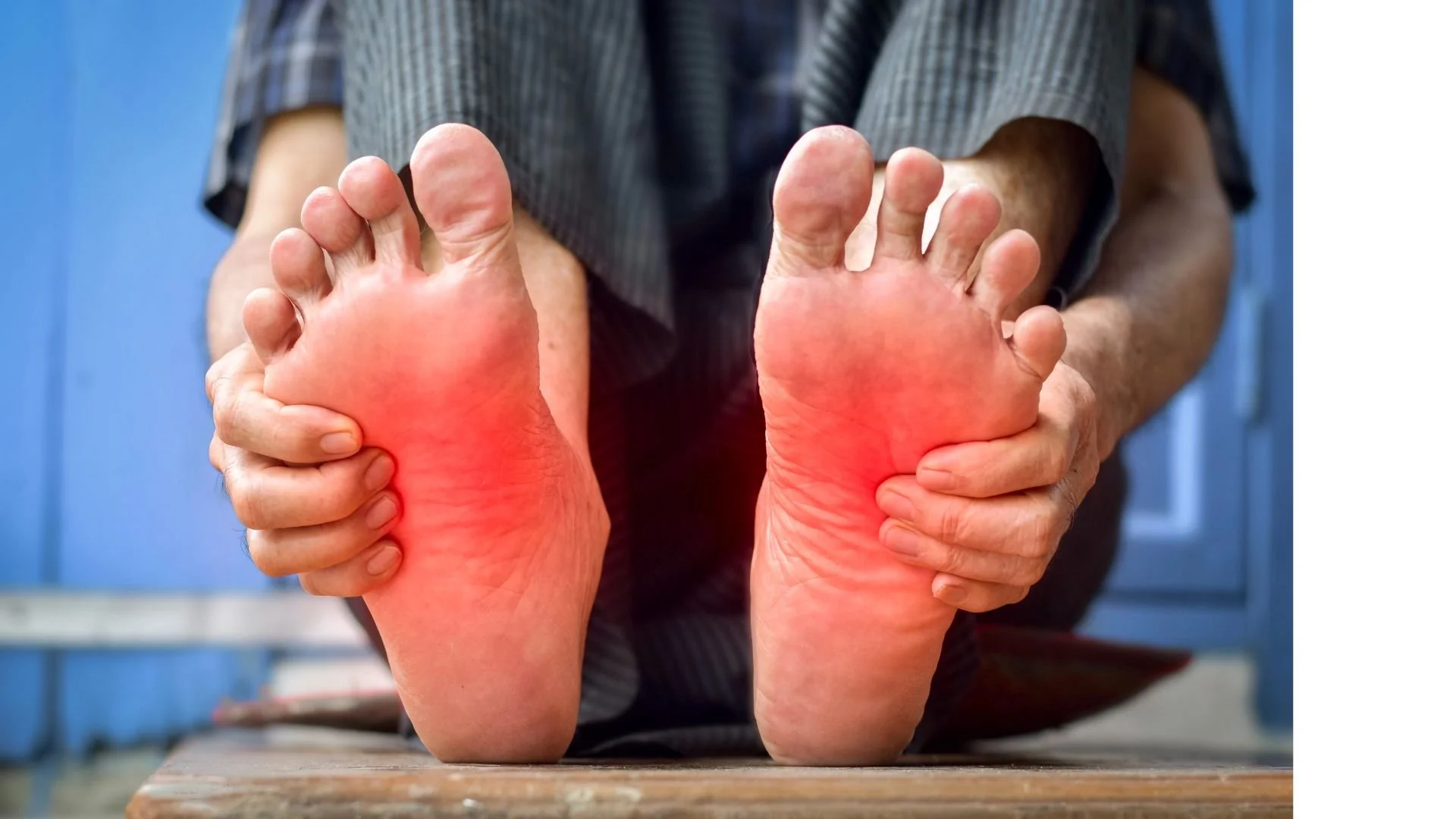What Is Peripheral Neuropathy?
Peripheral neuropathy refers to damage of the nerves in the peripheral nervous system – the network of nerves outside the brain and spinal cord. These peripheral nerves carry messages between the central nervous system (your brain and spine) and the rest of your body. When they’re damaged, those messages get disrupted or distorted. The result is often weakness, numbness, tingling, and pain in the extremities, usually the feet and hands. Peripheral neuropathy isn’t a single disease; it’s an umbrella term that covers many conditions involving nerve damage. It can affect sensory nerves (responsible for feeling), motor nerves (controlling muscles), or autonomic nerves (regulating automatic functions like blood pressure and digestion).
People with peripheral neuropathy commonly describe sensations like pins and needles, burning, or stabbing pains in the affected areas. Others experience extreme sensitivity to touch – even a bedsheet brushing against their feet can be painful. Conversely, some lose sensation and might not feel heat, cold, or injury properly. This loss of feeling can be dangerous because, for example, a person might not realize they’ve stepped on something sharp or that a wound is becoming infected. In some neuropathies, if motor nerves are involved, you might notice muscle weakness, balance problems, or difficulty with fine movements like buttoning a shirt. If autonomic nerves are affected, symptoms could include dizziness upon standing (due to blood pressure drops), digestive issues, or difficulty controlling bladder/bowel function. Most people with peripheral neuropathy have multiple nerves affected (a condition called polyneuropathy) rather than just one single nerve.
Common Causes of Peripheral Neuropathy
There are many potential causes of peripheral neuropathy, which is why identifying the root cause is a key part of treatment. Here are some of the most common causes and risk factors:
Diabetes: By far the leading cause in developed countries. High blood sugar over time can damage nerves and the small blood vessels that nourish them. More than half of people with diabetes develop some neuropathy, especially in the feet – a condition known as diabetic neuropathy. Good blood sugar control can help prevent or slow this.
Physical Injuries and Nerve Compression: Trauma is another major cause. This could be injuries from accidents (car crashes, falls) that sever or compress nerves. Even less dramatic causes like repetitive stress – say, carpal tunnel syndrome from constant typing – can pinch a nerve and cause neuropathy in a specific area. A herniated disc in the spine can compress nerve roots, leading to symptoms in a leg (sciatic neuropathy).
Infections: Certain infections attack nerve fibers. Examples include shingles (which can cause a painful neuropathy called postherpetic neuralgia), Lyme disease, HIV/AIDS, hepatitis B and C, and leprosy.
Autoimmune Diseases: In conditions like lupus, rheumatoid arthritis, or Sjögren’s syndrome, the immune system mistakenly attacks the body’s own tissues, including nerves, leading to neuropathy. There’s also Guillain-Barré syndrome, where an acute autoimmune reaction causes rapid-onset neuropathy (usually temporary but serious). Chronic autoimmune neuropathies, like CIDP (Chronic Inflammatory Demyelinating Polyneuropathy), involve ongoing immune-related nerve damage.
Vitamin Deficiencies and Nutritional Issues: Nerves rely on certain vitamins, so deficiencies in B vitamins (B1, B6, B12 in particular) or vitamin E and copper can cause neuropathy. This is sometimes seen in severe malnutrition or alcoholics (alcohol abuse can cause poor nutrition and directly poison nerves). Conversely, too much of some vitamins (like B6 in high doses) can also cause neuropathy.
Toxins and Medications: Chronic exposure to heavy metals (like lead, mercury, arsenic) or industrial chemicals can damage nerves. Even some medications have neuropathy as a side effect – notably certain chemotherapy drugs for cancer can cause numbness and tingling in the hands/feet. Some antivirals and antibiotics might also contribute in susceptible individuals.
Inherited Disorders: Some people inherit genetic conditions that affect nerves. The most common is Charcot-Marie-Tooth disease, a group of inherited neuropathies that cause gradually progressive weakness and sensory loss, usually starting in the legs.
Other health conditions: Kidney disease or liver disease can lead to toxin buildup that harms nerves. An underactive thyroid (hypothyroidism) can contribute to peripheral neuropathy as well. Cancer itself (apart from chemo) can cause neuropathy in various ways – sometimes due to paraneoplastic syndromes (where the immune response to a tumor inadvertently attacks nerves), or simply by a tumor pressing on nerves.
In some cases, no specific cause is found – this is called idiopathic neuropathy, and it’s frustratingly common in older adults. However, doctors will usually do a thorough workup (exam, blood tests, possibly nerve conduction studies) to rule out the treatable causes before calling it idiopathic.
Signs and Symptoms to Recognize
Given the variety of nerves that can be affected, peripheral neuropathy symptoms can differ from person to person. Sensory symptoms are most common, including:
Numbness and tingling: Often starting in the toes or fingers and moving upward (a “glove and stocking” pattern). You might feel pins-and-needles or as if you’re wearing invisible gloves or socks when you’re not.
Pain: Neuropathic pain can be burning, sharp, electric, or stabbing. Some describe it as freezing or hot pain. It may flare up at night, disturbing sleep. Activities that shouldn’t hurt, like lightly touching the skin or putting on shoes, can cause pain if neuropathy has made the nerves overly sensitive (a symptom called allodynia).
Poor balance or coordination: If your feet are numb, walking can be tricky because you can’t feel the ground properly. You may stumble more, or feel dizzy and unsteady, especially in the dark when visual cues are limited.
If motor nerves are involved, symptoms include:
Muscle weakness: You might find it hard to lift your foot (causing foot drop), open jars, or hold objects. Reflexes might be reduced. Over time, unused muscles can shrink (atrophy).
Muscle twitches or cramps: Damaged motor nerves can misfire and cause small jerking movements or cramping.
If autonomic nerves are affected, symptoms can be subtler but serious:
Dizziness or fainting: Particularly upon standing up, due to blood pressure drops (orthostatic hypotension).
Sweat abnormalities: Either sweating too much or too little, affecting temperature tolerance.
Digestive issues: Nerve damage to the digestive tract can cause constipation, diarrhea, or difficulty swallowing.
Bladder control problems: Leading to urinary retention or incontinence.
Sexual dysfunction: Nerves to sexual organs can be affected, causing issues like erectile dysfunction in men or arousal/lubrication problems in women.
If you notice symptoms like these – especially the classic pattern of pain or numbness starting in your feet and fingers – see a doctor. It’s important to catch neuropathy early. In fact, doctors advise not to ignore “just a little numbness” or that burning sensation in your toes that’s slowly worsening. Early intervention can sometimes prevent further nerve damage.
How Is Peripheral Neuropathy Treated?
Treatment of peripheral neuropathy has two main goals: treat the underlying cause (if possible) and relieve the symptoms. Addressing whatever is damaging the nerves can sometimes slow or even halt neuropathy progression. For example, if diabetes is the cause, improving blood sugar control is absolutely key. If a vitamin B12 deficiency is found, replenishing B12 can improve symptoms. If a certain drug is causing neuropathy, stopping or reducing that drug may help.
In many cases, though, nerves heal slowly (if at all), and symptom management is the focus. Here are common treatment approaches:
Medications for neuropathic pain: Ordinary painkillers like acetaminophen or NSAIDs (ibuprofen, etc.) often aren’t very effective for nerve pain. Instead, doctors turn to other classes of medications: Anti-seizure medications such as gabapentin or pregabalin can calm nerve firing and often reduce tingling and burning sensations. These may cause drowsiness or dizziness in some people. Certain antidepressants are also used for neuropathy – notably duloxetine (an SNRI) or tricyclic antidepressants like amitriptyline. These can alter how the brain and spinal cord process pain signals. It might sound odd to use an antidepressant for nerve pain, but research and clinical experience have found they can be quite effective. These meds are usually started at low doses to minimize side effects and then increased if needed. It’s important to take them daily as prescribed, not just when pain flares, because they work by gradually modulating nerve activity. In cases of severe pain that don’t respond to other agents, opioid analgesics or tramadol might be considered, but long-term use is generally avoided due to risks of addiction and the fact that neuropathic pain often doesn’t respond well to opioids.
Topical treatments: For more localized peripheral neuropathy (say you have an isolated nerve pain area), topical creams or patches can help. An example is lidocaine patches or gel, which numb the area and can provide temporary relief. Another is capsaicin cream (derived from chili peppers) which, when used regularly, can reduce a chemical in nerves that sends pain signals. At first capsaicin can cause burning or irritation on the skin, but over time it may lessen neuropathic pain for some people. There are also prescription-strength capsaicin patches that a doctor can apply for a short time to give longer-lasting relief for certain conditions (like post-shingles nerve pain).
Physical therapy and exercise: If neuropathy has weakened your muscles or affected your balance, working with a physical therapist can be invaluable. They can help strengthen muscles, improve coordination, and perhaps prevent injuries (like falls) by improving your gait. They might also recommend orthotic devices – for example, shoe inserts, braces, or a cane – to help you walk safely if you have foot drop or instability. Regular exercise like walking, swimming, or gentle yoga can actually reduce neuropathy pain and improve blood flow to nerve endings. It also helps maintain muscle mass and control blood sugar in diabetics, which in turn can slow neuropathy progression. Even if your feet are numb, exercises like seated aerobics or using a stationary bike (where balance is supported) can be great.
Managing underlying conditions: This is crucial. For diabetic neuropathy, controlling blood glucose through diet, medication, or insulin will help prevent further nerve damage. If the neuropathy is due to an autoimmune process, treatments might include immunosuppressive drugs (like corticosteroids or IV immunoglobulin) to calm the immune attack. In fact, for inflammatory neuropathies, procedures like plasmapheresis (where blood is filtered to remove antibodies) can provide improvement by reducing the immune substances attacking the nerves. Vitamin deficiencies are treated with supplements (for instance, high-dose B12 injections for pernicious anemia). Thyroid issues are treated with thyroid hormone replacement. Essentially, if there’s a fixable cause, fix it – sometimes that alone greatly improves neuropathy symptoms.
Advanced therapies: In some refractory cases, specialists may try treatments like transcutaneous electrical nerve stimulation (TENS) – mild electrical currents delivered through the skin to interfere with pain signals. Another option for extreme neuropathic pain is a spinal cord stimulator implant, which we mentioned earlier in context of pain management; it can help block pain in cases of painful diabetic neuropathy that don’t respond to anything else. For focal neuropathies caused by compression, surgery can be curative – for example, relieving a trapped nerve (like in carpal tunnel syndrome or a herniated disc pressing a nerve root) often reverses the neuropathy symptoms in that area. However, surgery isn’t useful for most polyneuropathies (like diffuse diabetic neuropathy) where nerves are damaged in many areas.
Lifestyle
Lifestyle and safety: If you have peripheral neuropathy, it’s important to protect affected areas, since numbness means you might not feel injuries. For instance, people with diabetic foot neuropathy should check their feet daily for cuts or blisters, wear well-fitting shoes, and avoid going barefoot to prevent wounds. Keeping your home well-lit and clutter-free can help prevent tripping if your balance is off. Also, avoid smoking and limit alcohol, as both can worsen neuropathy (smoking impairs circulation to nerves, and alcohol is directly nerve-toxic over time). Eating a balanced diet with adequate vitamins and nutrients supports nerve health. Some people find supplements like alpha-lipoic acid or acetyl-L-carnitine helpful for neuropathy, but you should discuss these with your doctor as research is mixed.
Living with peripheral neuropathy can be challenging, especially if pain or weakness interfere with daily life. But many people can manage their symptoms and lead active lives by combining medical treatments with healthy habits and safety measures. Early intervention is key – treating an underlying cause early (like controlling diabetes or stopping a offending drug) can sometimes prevent permanent nerve damage. And even if neuropathy is longstanding, modern treatments offer multiple avenues for relief. If you’re struggling with nerve pain or numbness, consider seeing a neurologist (a nerve specialist) for a comprehensive evaluation and to tailor a treatment plan that’s right for you. There’s often not a quick fix, but with patience and the right care, it is possible to improve your nerve function and quality of life.
Please note: This information is provided for educational purposes only and is not a substitute for professional medical advice. Always consult your primary care physician or a qualified healthcare provider regarding any questions or concerns about your health. Content created with the assistance of ChatGPT to provide clear, accessible medical condition descriptions.





